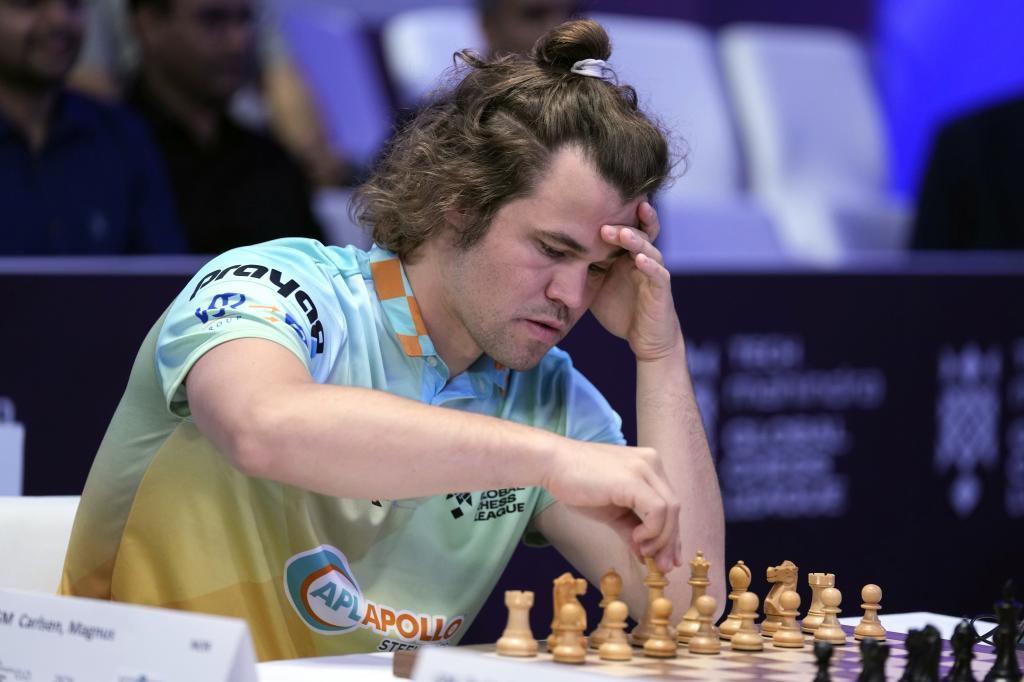Few chess players enjoy Magnus Carlsen's celebrity status.
A grand master at 13, refusing to play an American dogged by allegations of cheating, and venturing into the world of online chess gaming all made Norway's Carlsen a household name.
Few chess players have produced the magical commodity that separates Norway's Magnus Carlsen from any of his peers: celebrity.
Only legends like Russia's Garry Kasparov and American Bobby Fischer can match his name recognition and Carlsen is arguably an even more dominant player. Last month, he beat both men to be named the International Chess Federation's greatest ever.
But his motivation to rack up professional titles is on the wane. Carlsen, 33, now wants to leverage his fame to help turn the game he loves into a spectator sport.
"I am in a different stage in my career," he told The Associated Press. "I am not as ambitious when it comes to professional chess. I still want to play, but I don't necessarily have that hunger. I play for the love of the game."
Offering a new way to interact with the game, Carlsen on Friday launched his application, Take Take Take, which will follow live games and players, explaining matches in an accessible way that, Carlsen says, is sometimes missing from streaming platforms like YouTube and Twitch. "It will be a chiller vibe," he says.
Carlsen intends to use his experience to provide recaps and analysis on his new app, starting with November's World Chess Championship tournament between China's Ding Liren and India's Gukesh Dommaraju. He won't be competing himself because he voluntarily ceded the title in 2023.
Carlsen is no novice when it comes to chess apps. The Play Magnus game, which he started in 2014, gave online users the chance to play against a chess engine modeled against his own gameplay. The company ballooned into a suite of applications and was bought for around $80 million in 2022 by Chess.com, the world's largest chess website.
Carlsen and Mats Andre Kristiansen, the chief executive of his company, Fantasy Chess, are betting that a chess game where users can follow individual players and pieces, filters for explaining different elements of each game, and light touch analysis will scoop up causal viewers put off by chess's sometimes rarefied air. The free app was launched in a bid to build the user base ahead of trying to monetizing it. "That will come later, maybe with advertisements or deeper analysis," says Kristiansen.
While Take Take Take offers a different prospect with its streaming services, it is still being launched into a crowded market with Chess.com, which has more than 100 million users, YouTube, Twitch, and the website of FIDE the International Chess Federation. World Chess was worth around $54 million when it got listed on the London Stock Exchange.
The accessibility of chess engines that can beat any human means cheating has never been easier. However, they can still be used to shortcut thousands of hours of book-bound research, and hone skills that would be impossible against human opponents.
"I think the games today are of higher quality because preparation is becoming deeper and deeper and artificial intelligence is helping us play. It is reshaping the way we evaluate the games," especially for the new generation of players, says Carlsen.
At the same time, he admits that two decades after becoming a grand master, his mind doesn't quite compute at the tornado speed it once did. "Most people have less energy when they get older. The brain gets slower. I have already felt that for a few years. The younger players' processing power is just faster."
Even so, he intends to be the world's best for many years to come.
"My mind is a bit slower, and I maybe don't have as much energy. But chess is about the coming together of energy, computing power and experience. I am still closer to my peak than decline," he said.
Chess has been cresting a popularity wave begun by Carlsen himself.
He became the world's top-ranked player in 2011. In 2013, he won the first of his five World Championships. In 2014, he achieved the highest-ever chess rating of 2882, and he has remained the undisputed world number one for the last 13 years.
Off the table, chess influencers, like the world No. 2, Hikaru Nakamura, are using social media to bring the game to a wider audience. The Netflix series "The Queen's Gambit" burnished chess' unlikely cerebral sex appeal when it became one of the streamer's biggest hits in 2020.
And in 2022 Carlsen's refusal to play against Hans Niemann, an American grand master, who admitted to using technology to cheat in online games in the past, created a rare edge in the usually sedate world of chess. There is no evidence Niemann ever cheated in live games but the feud between the pair propelled the game even further into public consciousness.
Whether chess can continue to grow without the full professional participation of its biggest celebrity remains to be seen.
